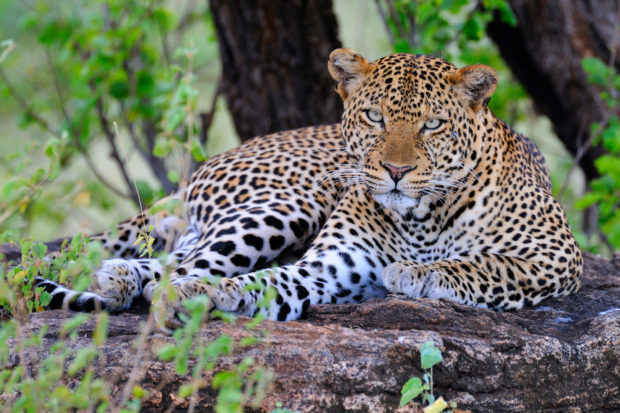
Americans imported the equivalent of at least 5,575 leopards between 2005 and 2014, nearly half of the global trade in leopard trophies during that period. Photo by Alamy
While we eagerly await President Trump’s follow-up on his decision to suspend imports of elephant and lion trophies from Zimbabwe and Zambia, we hope he takes a broad look at the trophy hunting of other threatened and endangered species and stops all imports of the animals for their heads, tusks, and other body parts. More specifically, we hope he adds leopards to the do-not-import list.
Leopards have not attracted nearly as much attention and concern as other imperiled big cats such as cheetahs and lions. But they have taken a terrible set of hits across their range. Leopard numbers in sub-Saharan Africa have plummeted by more than 30 percent in the last 22 years, in large part due to a combination of unsustainable trophy hunting, unyielding habitat loss and degradation, retaliatory killings for livestock kills, and trade in their skins for religious ceremonies.
On July 25, 2016, The HSUS, HSI, and coalition partners filed a legal petition recommending that the U.S. Fish and Wildlife Service list all leopards in Africa as endangered and prohibit imports of leopard trophies. The import of live leopards and other leopard parts (such as pelts for the fur trade) are required to meet rigid requirements, and yet the same is not required for trophies, meaning American hunters get something of a free pass to do as they wish with leopards.
Experts agree that leopard trophy hunting is unsustainable. Indeed, according to records produced by the USFWS, Americans imported the equivalent of at least 5,575 leopards between 2005-2014 – nearly half of the global trade in leopard trophies during that period. This is nearly 1.5 leopards imported every day for a decade into the United States, and the trend appears to be increasing. Killing males in their prime destabilizes leopard social structures, leading to increased female mortality and reduced survival for the cubs who may be killed by new males filling the territorial void.
Since 1975, leopards have had meaningful protections (Appendix I listing) under the global treaty that regulates trade in wildlife parts. The Convention on International Trade in Endangered Species of Wild Fauna and Flora (CITES) does not, however, prohibit trade in trophies, and only requires stricter permitting. Because of that gap in international law, it’s especially important that major nations such as the United States prohibit imports of leopard trophies, as a way to discourage trophy hunters from killing the big cats in their native lands.
The situation is so dire in South Africa – one of the major exporters of leopard trophies – that it prohibited export of leopard trophies for 2016 and 2017. And in response to dramatic declines in leopard numbers and growing threats, this species was given stronger protections in October by the Convention on Migratory Species, also an important international treaty organization.
The threat to leopards is real and escalating, especially so if the United States steps up protections for lions and elephants. Trophy hunters will turn their focus to leopards even more. Safari Club International, the largest trophy hunting club in the United States, is offering up five leopard trophy hunts on the auction site for its upcoming convention and fundraising event at the Las Vegas Convention Center in early February. The highest bidders, who will likely spend tens of thousands of dollars, will have the chance to kill these threatened animals in Namibia, Tanzania, and the Central African Republic. The African leopard is one of the Africa Big Five, the holy grail of trophy hunting, consisting also of the African elephant, the African lion, white or black rhinoceros, and Cape buffalo.
We celebrate the president’s declaration that the trophy hunting of elephants and other species is “a horror show,” and we eagerly await a final decision. Again, while he’s at it, we hope President Trump urges his Fish and Wildlife Service to do all it can to discourage Americans from killing threatened and endangered species for their heads. When it comes to leopards, he can urge the agency to heed the best available science, take the precautionary approach, and act quickly to prohibit the import of African leopard trophies. The species’ survival depends on it, and our humanity depends on it as well.
The post U.S. should change its spots on trophy hunting of leopards appeared first on A Humane Nation.
Enviroshop is maintained by dedicated NetSys Interactive Inc. owners & employees who generously contribute their time to maintenance & editing, web design, custom programming, & website hosting for Enviroshop.
